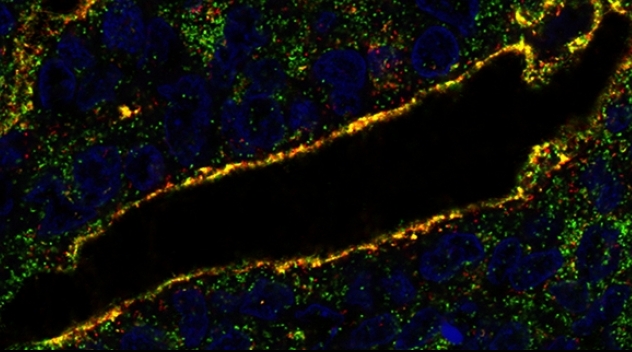Now comes the tools with the potential to revolutionise cancer research
With the upcoming launches of his award winning method to analyse protein activity in cells and a new artificial enzyme, Ola Söderberg, Professor of Pharmaceutical cell biology, aims to provide game changing tools to the fields of cancer research and cell biology.
Proteins constitute a principal building block in all living organisms, performing a number of essential tasks. They are best described as the workers of the cell where they act freely or in collaboration. To fully understand their significance and functions, we need methods to measure the activity of proteins, and when Uppsala University recently acknowledged 15 Attractive Innovation Projects, Molboolean and Ola Söderberg, Professor of Pharmaceutical cell biology, were among the recipients.
“Molboolean is a technology we have developed for labeling specific proteins with unique colors, where the proteins that bind to each other get a combination of the colors. It enables analysis of individual proteins in tissue sections with amplified signals, which generates more information than previously available tools. Right now, one of our industrial partners is taking steps to turn the method into a finished product in order to reach the market within a couple of years,” states Ola Söderberg.
With Molboolean, industry and researchers will have access to a tool that is likely to have great impact on, among other things, routine diagnostics - and it is as a problem solver Ola Söderberg's research group has made a name for itself within molecular biology: to identify challenges and develop the methods required to face them. Along the way, the team has made a number of notable publications that today are cited and applied in thousands of contexts.
“In short, we develop technologies that open new doors for researchers around the world. Several of the tools we have introduced are based on the analysis method, in situ PLA, that we launched in Nature Methods in 2006. Our methods are well used, and every week we receive questions and requests, often providing suggestions for future research projects.”
One of the most important tasks of proteins is to catalyse chemical reactions in their role as enzymes. The fact that research within molecular biology often depends on natural enzymes can lead to limitations. In order to enable new and more effective methods, Ola Söderberg has developed Sloppymerase, an artificial enzyme with the potential to pave the way for a technology that allows the mapping of DNA damage.
“The enzyme is all set to use and we are currently waiting for a patent before we will publish our work in 2022. In parallel, we aim to, applying Sloppymerase, develop new models for laboratory studies of the development of cancer. So far, our results give us every reason to face the future with optimism, and we hope to have the funding ready relatively soon to take the next step,” says Ola Söderberg.
Despite numerous and important advances, Ola Söderberg still finds inspiration in curiosity and the delights of creativity, constantly searching to develop new methods – a continuous journey forward with driving forces that he attributes to his group and the environment in which they operate.
“I see us as a well-composed team where everyone has their clear roles and each individual competence comes to use. The fact that we in 2017 joined Uppsala University's Faculty of Pharmacy - whose many skilled groups complete each other and encourage interest-driven research - has added yet another valuable dimension to our operation. Today, we maneuver in an extremely favorable environment that gives us the stimulus and the conditions we need to continue to contribute to the development of cell biology.”
Magnus Alsne

